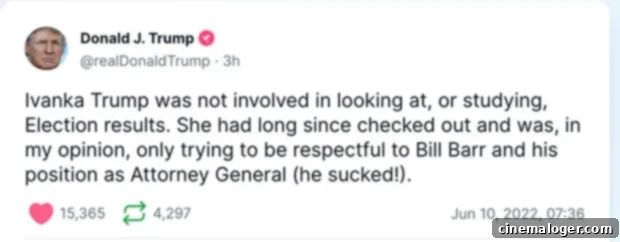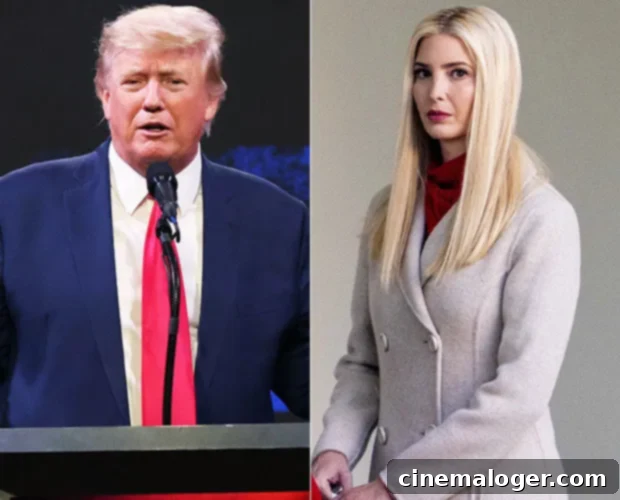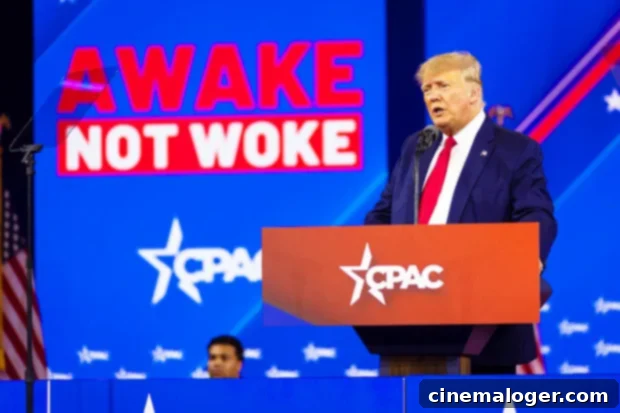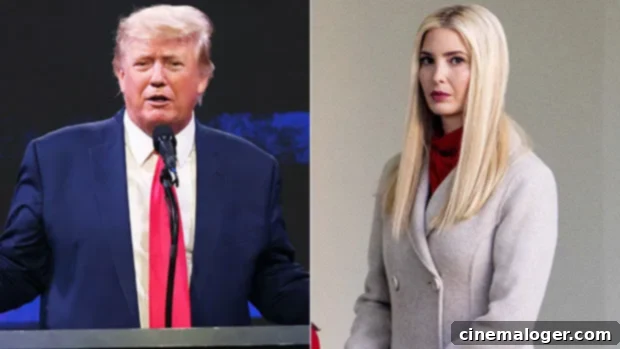Donald Trump Challenges Ivanka’s January 6th Testimony: A Deep Dive into Election Fraud Claims and Political Fallout
The political landscape was once again rattled as former President Donald Trump took to his Truth Social platform on Friday, June 10, to publicly respond to a significant moment from the January 6 Select Committee hearing. The hearing featured a pre-recorded interview with his daughter, Ivanka Trump, where she acknowledged and “accepted” the findings of former Attorney General William Barr, who had concluded there was no substantial evidence of fraud in the 2020 presidential election. This public disagreement between father and daughter immediately captured widespread attention, underscoring the deep divisions and unresolved controversies surrounding the election and the events of January 6th.
During the Thursday, June 9 hearing, a clip of Ivanka Trump’s interview was presented, where she stated her acceptance of Barr’s conclusion. Her words contradicted the persistent narrative of widespread election fraud championed by her father. Donald Trump’s reaction was swift and pointed. He asserted on Truth Social that his daughter’s involvement in assessing election results was minimal, claiming, “Ivanka Trump was not involved in looking at, or studying, Election results. She had long since checked out and was, in my opinion, only trying to be respectful to Bill Barr and his position as Attorney General.” This statement not only attempted to discredit his daughter’s perspective but also aimed to diminish the significance of her testimony, implying she lacked the direct insight to form an independent judgment on the matter.

The Former President’s Unwavering Stance on Election Integrity
Despite numerous investigations, audits, and court rulings that found no evidence of widespread election fraud sufficient to alter the 2020 election outcome, the former President continued to propagate his claims that the election was unjustly stolen. In his subsequent posts on Truth Social, he explicitly attacked Barr, suggesting that the former Attorney General had been unduly influenced by Democrats to publicly state he found no evidence of fraud. “The Democrats hit pay dirt with Barr, he was stupid, ridiculously said there was no problem with the Election, & they left him alone. It worked for him, but not for our Country!” Trump wrote, dismissing Barr’s findings as a politically motivated capitulation rather than an objective assessment.
This steadfast refusal to acknowledge the legitimate results of the 2020 election has been a cornerstone of Donald Trump’s post-presidency narrative. His consistent rhetoric has had profound implications, fueling distrust in democratic institutions and contributing to the political polarization gripping the United States. The January 6th Committee hearings have sought to highlight the direct link between these unsubstantiated claims and the violent events at the U.S. Capitol, portraying the former president’s actions and statements as central to the crisis.
Bill Barr’s Definitive Rejection of Fraud Claims
The testimony from William Barr, a loyal appointee of President Trump, has been particularly damaging to the election fraud narrative. Barr, who served as Attorney General during Trump’s administration, provided candid accounts of his conversations with the former President regarding the election results. During the interview segments previewed by the committee, Barr recounted how he personally informed Trump that he saw no evidence of significant voter fraud that could have altered the outcome of the 2020 election. In one clip, Barr emphatically stated, “I made it clear I did not agree with the idea of saying the election was stolen and putting out this stuff, which I told the President was bulls**t.”
This blunt assessment from a high-ranking official within Trump’s own administration underscores the isolation of Trump’s claims within his inner circle, particularly among those tasked with upholding the law. Barr’s statements reveal that Trump was directly confronted with the lack of evidence for his fraud allegations by his chief law enforcement officer. Ivanka Trump’s subsequent acceptance of Barr’s findings, as shown in another clip, represented a notable deviation from her father’s public stance, giving added weight to Barr’s testimony. Trump, however, offered one final, characteristic dig at his former AG, stating simply that “he sucked,” further illustrating his refusal to accept any dissenting views on the election outcome.

The January 6th Attack: Blame, Denial, and the Committee’s Pursuit of Truth
As the January 6th Committee intensified its efforts to present its findings to the American public, Donald Trump continued his morning tirades, not only spreading false claims about the election but also deflecting blame for the violent storming of the U.S. Capitol. He asserted, “The so-called ‘Rush on the Capitol’ was not caused by me, it was caused by a Rigged and Stolen Election!” This argument attempts to shift culpability from his own actions and rhetoric to the alleged illegitimacy of the election itself, a claim that has been widely debunked.
Trump’s involvement in the January 6th riot has been a central focus of investigations and public discourse since the insurrection. The events of that day, where a mob of his supporters breached the Capitol building in an attempt to prevent the certification of the 2020 election results, are widely viewed as an unprecedented assault on American democracy. The January 6th Select Committee was specifically formed to investigate the facts, circumstances, and causes of the attack, and to recommend legislative or other corrective actions. Their hearings aim to meticulously document the former president’s actions, his efforts to overturn the election, and his role in inciting the crowd that ultimately marched on the Capitol.
President Biden’s Strong Condemnation and the Aftermath
On the first anniversary of the January 6th insurrection, President Joe Biden delivered a powerful speech, directly criticizing his predecessor for spreading the lies that ultimately led to the riot. Biden underscored the historical significance of the event, stating, “For the first time in our history, the president had not just lost an election, he tried to prevent the peaceful transfer of power as a violent mob stormed the capitol but they failed.” President Biden’s remarks highlighted the gravity of Trump’s actions and their impact on the fundamental principles of American governance. He emphasized that the peaceful transfer of power is a cornerstone of democracy, and that Trump’s attempts to subvert it represented a profound threat to the nation’s democratic institutions.

Following Biden’s condemnation, Donald Trump predictably doubled down on his “big lie” and lashed out at the committee investigating the riot. He released a statement after Biden’s speech, dismissing the committee as the “Unselect Committee of totally partisan political hacks, whose judgement has long ago been made.” He questioned their focus, asking, “Why is it that the Unselect Committee… not discussing the rigged Presidential Election of 2020? It’s because they don’t have the answers or justifications for what happened.” This rhetorical strategy aimed to delegitimize the committee’s work and reinforce his narrative that the investigation was politically motivated rather than an impartial search for truth.
The Impeachment, Republican Reactions, and Lingering Consequences
The January 6th insurrection, where Trump supporters stormed the Capitol in an attempt to overturn the 2020 presidential election results, led to unprecedented consequences for the former president. For his role in inciting the riot, Donald Trump was impeached by the House of Representatives for a second time, marking him as the only U.S. president in history to be impeached twice. Although he was ultimately acquitted by the Senate, the impeachment proceedings themselves served as a powerful testament to the gravity of his actions and the deep concern among lawmakers.
Even some Republicans who had previously been staunch supporters of Trump publicly criticized him in the wake of the insurrection. Among them was commentator Geraldo Rivera, who released a series of tweets expressing his disillusionment with his long-time friend. Rivera articulated the sentiment of many who believed Trump was culpable, writing, “He knew what mob intended from the jump. #StopTheSteal crowd was raucous & seething. Many were armed-All angry. What the hell did #POTUS think they were going to do?” Such reactions from within his own party underscored the widespread shock and condemnation that followed the Capitol attack.
The ripple effects of the January 6th insurrection and the persistent claims of election fraud continue to shape American politics. The events have prompted ongoing debates about election security, political rhetoric, and accountability for leaders. The January 6th Committee’s hearings, featuring testimonies from key figures like Ivanka Trump and William Barr, are designed not only to uncover the full truth of what transpired but also to safeguard the future of democratic processes in the United States. The public discourse surrounding these events highlights a crucial period in American history, as the nation grapples with the challenges of maintaining democratic norms and ensuring a peaceful transfer of power.
